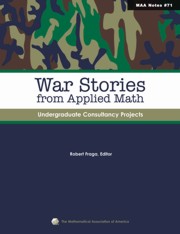Book contents
- Frontmatter
- Contents
- Introduction
- An Industrial Mathematics Program
- Source of Problems: Industrial Contacts
- Panel Discussion Following “Industrial Contacts”
- Course Integration
- The Consortium for Mathematics and Its Applications (COMAP)
- Program Management
- Project Deliverables I
- Project Deliverables II
- Using Projects from Industry to Teach Mathematics and Statistics to Liberal Arts Majors
- Mathematical Modeling in ICIC Projects
- Appendix: A Sample HMC Report
Mathematical Modeling in ICIC Projects
- Frontmatter
- Contents
- Introduction
- An Industrial Mathematics Program
- Source of Problems: Industrial Contacts
- Panel Discussion Following “Industrial Contacts”
- Course Integration
- The Consortium for Mathematics and Its Applications (COMAP)
- Program Management
- Project Deliverables I
- Project Deliverables II
- Using Projects from Industry to Teach Mathematics and Statistics to Liberal Arts Majors
- Mathematical Modeling in ICIC Projects
- Appendix: A Sample HMC Report
Summary
All the participants at the Marquette workshop who have contributed to this book come from large and/or elite schools. Can those of us who work at small liberal arts colleges which don't have the prestige of Harvey Mudd College do what Bob Borrelli does there? How can we start building the track record which he suggests is necessary to win projects? These are not easy questions, and answers will vary from one place to another, but I can share my experiences at Baker University, where I have worked for the past eight years and at Ripon College, where I worked at the time of the workshop, in the hope that these may suggest ways to go about doing math consultancy projects.
First a hypothetical question, “Why bother with projects like these? Isn't life in academia hectic enough without taking on what could be a punishing additional workload?” There is evidence that consultancy work has real value for undergraduate students. Such work exhibits the relevance of mathematics to contemporary life, and it develops skills that are useful in a broad spectrum of activities: problem solving, learning to work as a team, meeting deadlines, and communicating effectively. As I wrote in the introduction to this collection, students who participate in a consultancy project will not ask “What good is mathematics?” after their experience in that project. And the project involves more than math: frequently there are social, legal, and political issues which arise during the work. Examples of some of these have already been given. Borrelli's tale of the L.A. Superior Court project is one.
- Type
- Chapter
- Information
- War Stories from Applied MathUndergraduate Consultancy Projects, pp. 105 - 118Publisher: Mathematical Association of AmericaPrint publication year: 2007



